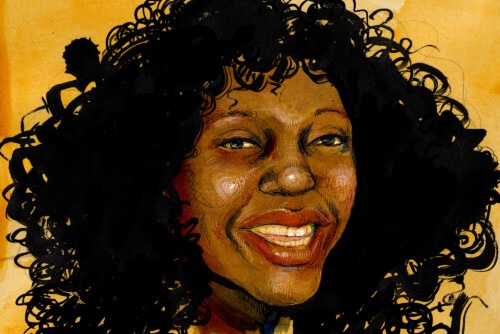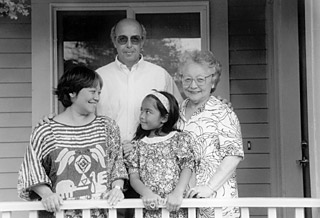A response to the panel “Using Knowledge, Advancing Activism” at the conference Activism and the Academy: Celebrating 40 Years of Feminist Scholarship and Action. Watch the video here:
Activism is divination of knowledge through rites of friendship. Knowledge, which otherwise remains coiled within different parts of my body, generates unlimited pleasure and power when unleashed through collective organizing. In the introduction to the “Using Knowledge, Advancing Activism” panel, Laura Flanders narrated an incident from her Barnard college days. Laura recollected co-organizing with Maria Hinojosa one of the (then) largest protests on the Barnard campus against Jean Kirkpatrick (from the Iran-Contra years). Jamia Wilson drew on her grandmother’s story as she enumerated the importance of memory within black feminist knowledge production. Similarly, Rinku Sen recollected her discomfort joining a protest on her campus that demanded the institutionalization of ethnic studies. Sen’s friends devised an intervention in order to break through her discomforts, which allowed Sen to join the protests. Participating in a protest created a sense of belonging for Sen. Their acts of recollecting stories from their past demonstrated processes of uncoiling memories as pathways for creating knowledge. Much like Laura Flanders, Jamia Wilson, Dean Spade, and Rinku Sen, I approach activism as a process of community building. The process of community building begins with generating stories of love, loss, strengths, capacities, and visions. Knowledge is a set of abstractions generated from personal stories within activist circles. Friendship, visions of justice, and heartbreaks entangle us all within networks of pleasure/knowledge.
My reflections on the “Using Knowledge, Advancing Activism” panel cannot be separated from my memories of organizing with many of the panelists. As I heard Dean Spade’s voice, I recalled walking with Dean from the Judson Memorial Church to Nowhere Bar in New York City. It was an early fall evening. We were walking in a small group from the Audre Lorde Project’s anniversary celebration. Dean and I started discussing the possibilities of collectively organizing around issues of transgender detainees and asylum seekers. Our conversation was informal. I was sharing my frustrations with the precarious nature of immigrant-rights activism. Dean’s smile from that evening walk and reassurances of the importance of queer immigrant-rights organizing still send electric shockwaves through my body. The electric shockwaves propel my fingers to type words and sentences for this brief reflection. Rinku Sen’s voice sparked memories of drinking with her at the Creating Change Conference in 2006, while sharing notes from our diverse immigrant-rights organizing initiatives. I share these stories and the feelings they generate in order to demonstrate the vast repository of sensations, feelings, and knowledge which lie embedded within circles of activism and political advocacy. Using knowledge to advance activism calls for unleashing stories, feelings, and sensations within communities on the margin toward strategies of transgressive life-making.
The panel shed light on key strategies for life-making and resistance. Dean Spade spoke about the politics of horizontal engagement practiced at the Sylvia Rivera Law Project, while Rinku Sen highlighted using knowledge for generating a diagnosis and strategies for action and persuasion. Jamia Wilson reminded us of her grandmother’s standpoint and of the role of local media in developing critical thinking. Horizontal engagement calls for a commitment to nonhierarchical organizational structures—centering communities (such as people living with mental and physical illness, homeless people, and undocumented immigrants) within organizational membership structures. The politics of horizontal engagement calls for centering friendship networks and networks of support and survival within social justice formations. Much has been written about nonhierarchical organizational models, but most of this literature does not address the pleasures of friendship and the desire to breathe and build a world filled with love, solidarity, and economies of shared favors, which resonate within the politics of horizontal engagement. I recently had the opportunity to visit several Kolkata-based organizations working on issues of gender, sexuality, and child-protection. I spent time with organizers in cramped office spaces, drinking cups of tea while listening to stories of heartbreak, love, and entanglement. The majority of the organizers spent copious amounts of time nurturing members within their community, planning birthday celebrations for co-organizers or arranging housing for staff that had been rendered homeless. Deep Purakyastha, the director of Prajaak (a child protection organization) asserted to me the importance of friendship within his organization. I was awestruck by his answering work phone calls at night, which Purakyastha articulated as based on the need for him, as an older brother, to be present with his staff during difficult periods in their lives. Aakansha and Malabika, lead organizers from Sappho for Equality (the only support group for lesbian, bisexual and transgender women in Eastern India and based in Kolkata), welcomed me at a regular Sappho support-group meeting. I sat with members of Sappho for Equality, sharing stories from my activist past in Kolkata. Malabika mentioned that she had exchanged emails with me since 2000. I had arranged for one of Sappho’s members to attend DesiQ 2000 (an international gathering of lesbian, bisexual, transgender, queer, and questioning South Asians organized by Trikone San Francisco in 2000). Little did I know the steps Malabika took to help one of the members acquire an Indian passport in order to attend DesiQ. I am inspired by the everyday commitments to the politics of friendship and to centering the needs of community members within their organizations.
The politics of horizontal engagement stem from everyday necessities within activist communities in Kolkata, much like in Dean Spade’s narrative about SRLP in New York City. Resisting the professionalization of the social-justice sector calls for creating knowledge about the dreams, fantasies, and desires to create economies of shared favors and nonhierarchical organizations within diverse and transnational movements for social justice. Finally, one needs to rethink horizontal arrangement when discussing academic-activist, across-the-meridians, North/South collaborations. Thinking and acting diagonally requires reimagining academic-activist, North-South arrangements which lie beneath or cut through formal organizational and professional frameworks. Academic-activist collaboration has taken on several shapes and viral modalities. The affective networks of Facebook, Twitter, and applications such as What’s App are critical circuits for activism and academia.
Rinku Sen drove home the need for continuous academic-activist, collaborative knowledge-production initiatives while speaking about the successful use of research within activism. I strongly believe that friendship and a politics of diagonal life-making mediate the rupture between academics and activists as they work toward ushering in possibilities for social justice. I straddle academic and activist life-worlds. The traffic between these two worlds is filled with anxiety and potentialities. I am neither totally inside US academic circles nor completely outside transnational activist networks. I am learning to embrace my rather queered location and approaches to knowledge production. Academics can bring a plethora of resources and tools for knowledge creation, while activists are best able to articulate on-the-ground needs, community-based research tools, and networks for disseminating research findings. A loving coalition of activist/academic networks arranged diagonally across latitudes and longitudes enables the healing of harms and the creation of tools for unlearning tropes of oppression, abandonment, and loss. I wish for knowledge that helps us unleash our desire for a different world, a world rife with affective networking, friendships, and unlimited transgressions.



